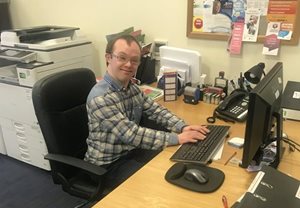The under provision of support services was initially highlighted during a presentation to the denomination’s recent General Assembly entitled ‘People Matter to God’, before being raised again in a debate on the last day of the weeklong gathering.
Greater support needed
“Learning Disability Week is a great opportunity to focus on the huge potential that people with a learning disability have and their contribution to society. It is also an opportunity to highlight areas where greater support and resources are needed so that people can reach their full potential,” said Lindsay Conway, Secretary to PCI’s Council for Social Witness that has responsibility for the denomination’s social care ministry.
“At our General Assembly we recognised the acute need for an increase in support services for people with a learning disability, especially in the post-19 age group.
“The provision of ‘day opportunities’ for adults with a learning disability, for example, depends very much on where in Northern Ireland you live. Transport is also often a difficulty as family members have to provide the transport to get their son or daughter to college or supported employment. Cuts to community transport particularly in rural areas also causes difficulties for people to get to their appropriate day opportunities.
“As a Church supporting people with a learning disability we will continue to raise our concerns at the slowness of change and the pressures on families. These issues facing families were ably and passionately described by our Disability Services Committee convenor Rev. Peter Dickinson in our debate on the last day of our Assembly,” Lindsay Conway said.
A personal account
During the debate, Rev. Dickinson told members of Assembly of the difficulty he and his family had faced in 2002, trying to find a place in an Adult Care centre for his son as he turned 19.
“Many young people, including our own son, had nowhere to go when they left Special School in June that year - due to a lack of financial resources, there were no places available for them in Adult Centres. Sadly, in the years since, many more families have had to go through a similar experience,” he said.
“Almost overnight, everything changes. Gone are the structured, learning-focused environments, the respite periods under Children’s Services and the Social Worker who has gotten to know the individual and the family over the years. Adult Services take on responsibility, but with so many competing needs to be met in society, young people with learning disabilities often find themselves at the back of the queue,” Rev. Dickinson explained.
He also stressed the need for a functioning Northern Ireland Assembly to legislate on these issues, saying, “Every time there has been a debate relating to learning disability issues in the Northern Ireland Assembly, there has been cross-party recognition of the lack of provision, with motions passed indicating a desire to improve things. However, in reality, learning disability has all too often been the first area to suffer cutbacks within the budgets of the various government departments.”
Through its Council for Social Witness, the Church provides a number of services for people with a Learning Disability in the post-19 age group. Up to 50 residential care placements are available across the Church’s residential care homes in Dundonald, Newcastle and Co. Wicklow, with day care facilities for a further 9 individuals. Additionally, supported living placements for 12 tenants are provided in the Church’s Willow Brook and Topley Terrace supported housing schemes in Coleraine.
Describing these services as “a God-send to the individuals and families involved”, Rev. Dickinson added that “they are still just a drop in the ocean. We need to do more, doing together what individuals and families can’t do alone.”
“While we are proud of the services the Church currently provides, we will continue to explore how these could be further developed to meet the growing needs in this crucial area of social care,” he said.
A personal experience
 Writing in a blog for presbyterianireland.org as part of Learning Disability Week, Kenneth Downes a Volunteer Intern in the Council for Social Witness talked about his experience of working for the Church for a number of years. “Working is an important part of my life. I like coming to work, it keeps me busy, I might be bored if I didn’t come to work.”
Writing in a blog for presbyterianireland.org as part of Learning Disability Week, Kenneth Downes a Volunteer Intern in the Council for Social Witness talked about his experience of working for the Church for a number of years. “Working is an important part of my life. I like coming to work, it keeps me busy, I might be bored if I didn’t come to work.”
“My favourite thing about working in Social Witness is meeting everyone in the office, they are very kind and caring and I like being part of the team…I love to work and I always do my best,” he said.